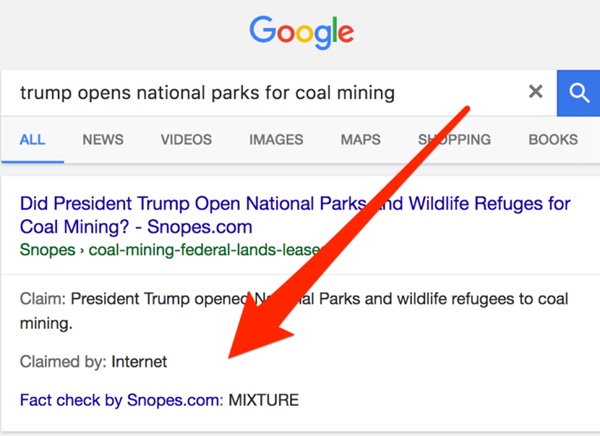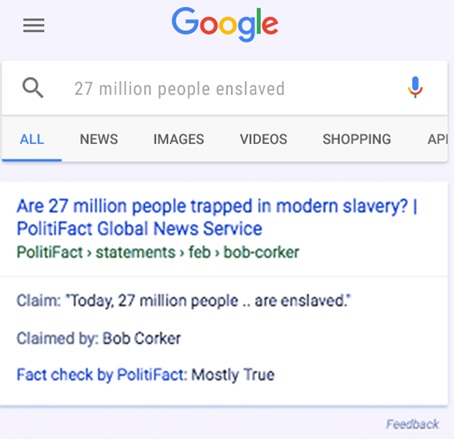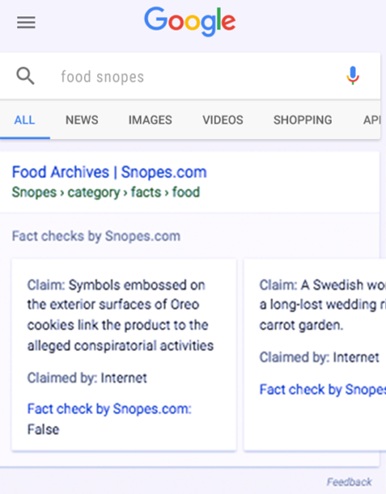Often times, we come across articles/blogs/write-ups on the internet that not only just catch our attention but also leave us startled. There have been several occasions where you read something that wondered if this is even true? And you tried to verify the claim but could not find any real evidence to validate the claim. To address this common issue, Google, the most popular search engine has plans to callout for fact-checking articles to help the everyday browsers to get the right answers.
In October 2016, Google had launched ‘support’ to highlight fact-checking articles within Google News in the UK and the US. Google is now launching these articles as part of its general Google search from around the world. Still confused? The example below will give you a clear picture:
One of the most widely searched topic on Google recently was whether Hillary Clinton sold uranium to Russia. Now you may read about various articles including where the President Donald Trump has claimed that Clinton did sell uranium to Russia. Now, you would very well know that not all things you read on the internet are true so how do you find the reality. This is where the ‘Fact Check’ comes in the picture. When you use the keywords ‘Clinton sold uranium to Russia,’ you would find fact-check site appearing on top of the search result (see image below), saying the claim is baseless and false.

This is the usual web search listing with a special callout, which is known as ‘rich snippet’ to validate the particular claim. In the above example, you can clearly see that the claim is attributed to the general global internet users and the claimed is declared to be false.
Let’s take a look at another example:
The claim is – President Trump has opened new parks for coal mining. (see the picture below)

The fact-check dispels the claim is by the general internet users and the verdict is that it is a mixture, which means it cannot be ascertained whether the claim is completely true or false.
In both the examples above, the source is Snopes.com. However, any publisher on the web can gain the special fact-checking callouts. Here is another example with different publisher (PoltiFact) as the source:

In case there are more than one fact-check article available, which is considered to be fit to appear for a certain search it would appear like this:

If you browsing on your mobile phone, the fact-check would appear as a carousel and on the desktop the multiple fact-checking articles are shown as part of the regular search results.
As a browser, you need to remember that in case of multiple fact-check articles it is not necessary that all the articles would confirm or corroborate the fact. Depending on the subject you are searching for, you may as well get different fact checking articles that are conflicting with each other. Talking about the fact-check expansion, Google in its blog has stated that the information will not be available for all search results and there might also be cases where different publishers have check the same claim but have different verdicts.
As a user, you need to know that the fact checks are not done by Google and it is by no means involved in the verdict. The fact-check articles are presented to the people so that they can make a more informed judgement.
Although you may find different conclusions presented on the search result, you can still figure out the percentage of consensus around a certain claim and have a more clear information on the subject.
There are also chances that you may come across fake fact checks. This is because any publisher can mark their content as a fact-check article and put the right meta data on their page and it would appear as a fact-check article. To ensure that you as a publisher, you need to be transparent about the sources and the methods involved in fact-checking. Markup alone is not enough, however, Google says that it’s search algorithm need to verify if a publisher that is deemed an ‘authoritative source.’
Whilst Google in its blog post has not explained what exactly is an authoritative source or how is it determined, Google has mentioned that the sites that violate the guidelines and promote violence or hatred would not be eligible for listed as an authoritative source.



